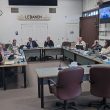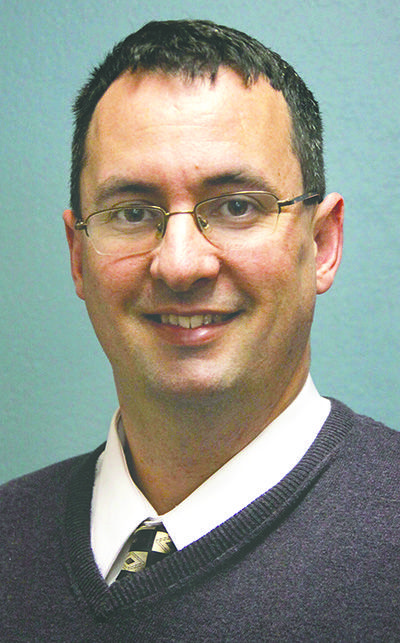Jeff Goodwin believes he can bridge gaps in Salem.
Jeff Goodwin thinks he can make a difference in the Oregon Legislature, bridging a gap between Democrats and Republicans to get things done where they have common ground.
Goodwin, a Sweet Home attorney and City Council member, is the Independent Party candidate for House District 17. He also is listed as the Libertarian Party candidate. He faces incumbent Republican Sherrie Sprenger, who also received the Democratic nomination via write-in.
“I decided to run for office because I felt like I could make a difference,” Goodwin said. “It’s important to give people options.”
The Democrats haven’t run a candidate with a chance of campaigning successfully for the job, he said.
“I’m not running against Sherrie Sprenger,” he said. “I think she’s a great person. I think she’s done a good job.”
Rather, “I’m running for something,” Goodwin said. He and Sprenger probably agree on a lot or have slightly different ideas about getting to the same goal, he said.
She’s done a good job, he said, but he thinks he might be able to do better.
His priorities should appeal to both sides in the legislature, he said.
First is human trafficking and sexual exploitation.
“There is a lot of trafficking, a lot of women getting caught up in that,” Goodwin said. They may be in Portland one day, Medford the next and California after that.
“We don’t have the resources in place that we need,” he said. Ore-gon needs better statewide coordination and local support to assist local police forces.
His second priority is emergency preparedness.
“We know the big one is coming,” Goodwin said, referring to a potentially massive subduction zone earthquake that scientists say could cause serious widespread damage across the Northwest. The quakes have occurred periodically on a cycle of centuries. The last one occurred more than 300 years ago.
“We’re not adequately prepared,” Goodwin said. “There’s kind of a mentality that, ‘I’m on my own.’ I like to view it as we’re connected to the rest of the world.”
The rest of the world will send help, as it did following Hurricane Katrina, for example, Goodwin said. That means Oregon needs to keep its ports, arteries, airports and Interstate Five open, so they can get to earthquake victims.
If I-5 is breached, he said, he wonders how quickly Oregon could get it repaired.
“I think we can do a better job of being prepared,” Goodwin said. Individuals need their 72 hours of food and water, but after that he’s looking for outside help through infrastructure that can survive or be repaired quickly.
The other part of his priority is inappropriate placement of infrastructure, he said. Oregon has schools in tsunami zones. Oregon also has a lot of antiquated structures that need to be updated.
Oregon could offer more to help upgrade existing homes, he said. It doesn’t take a lot to prepare a house to survive a quake.
“We can’t do everything in one year,” he said, but he wants to make sure Oregon has a plan.
Third, Goodwin wants to give a voice to underrepresented people, those who aren’t heard.
“My biggest concern is about immigrants, workers who have lived here their whole life and they’re in undocumented status,” Goodwin said, people who have been productive here all of their lives. They have no access to courts or licenses.
For convicted felons, who have served their time, they aren’t able to vote or own a gun, Goodwin said. “I would be in favor of looking more closely at the right to vote, especially after they’ve served enough time.”
In Switzerland, Goodwin said, felons have “the right to be forgotten.” It’s illegal there to bring up past crimes once they’ve served their time.
He would like to take a more compassionate view, maybe not for every drug dealer, but he would like to take a look at it.
“They need a job,” Goodwin said. “There’s plenty of work to be done.”
Farmers have a hard time finding people to pick for $12 an hour, he said.
He would consider extending voting rights to a younger age, he said. “Our kids don’t feel like they’re involved. I think we should get them to care.”
It’s not a danger to society, he said. The benefits of their involvement will outweigh the negatives.
“How do we get more people involved, so they care about what’s going on?” he asked.
He wants to represent those voices and not the big-money interests, he said, to teach them voting is important and it matters who they vote for.
Goodwin said he’s also concerned about how the state spends money. He found Cover Oregon frustrating, with all of the money spent on a system that never worked.
“One of the wisest things the state did was setting a cap on property taxes,” Goodwin said. The idea is to “determine what you think the reasonable percentage is and stick with it.”
Not doing it that way is like the boiling frog metaphor, “death by gradation,” he said. That’s where Europe has taxes as high as 60 percent.
He would like to set a fixed level for taxes and close loopholes, Goodwin said. Everyone should pay their share of the tax burden.
“If you want more, then you’ve got to show me you’re not wasting it,” he said.
Measure 97 is a terrible idea, Goodwin said. “It’s a backdoor attempt to sneak in a sales tax.”
Unlike most sales taxes, it doesn’t have an exemption for food and necessities, he said.
Goodwin isn’t against having enough money to pay for services, he said, but that requires prosperity.
“I think the focus has to be getting out of the way of business,” Goodwin said. Measure 97 is the opposite of that.
The state needs to get unnecessary regulations out of the way, he said. “You can’t sell pure gasoline in this state. (Ethanol), that’s a social program put on the people of this state.”
What if he likes incandescent light bulbs? Goodwin asked, referring to the federal ban on that product.
“It is very difficult to be in business,” he said. He’s had business owners tell him they’re leaving the state. A mill is leaving the state because the state considers sawdust air pollution and threatened to shut down the plant.
“We’re losing those jobs,” Goodwin said, because sawdust is “a dangerous pollutant.”
That’s the kind of issue that concerns him.
The minimum wage is another, he said. “I care all about making sure people are paid well. The minimum wage is not an effective way.”
Price floors result in surpluses, Goodwin said. It doesn’t take much to solve the reason why people aren’t making more. They need better education, job training and support.
People don’t really want to talk about the fundamental question of what government can have, he said, so he’s not likely to pass legislation addressing it.
He’s got one vote, Goodwin said, so his focus is on things he can do together with Democrats and Republicans as long as they’re proposing sensible reforms.
Sprenger goes to Salem and has to fight Democrats, Goodwin said. What he offers is to bring people together.
He is “someone who can work with Democrats,” he said, but he won’t compromise his basic principles, such as freedom of speech, the right to bear arms and freedom of religion.
Goodwin said he can sit down with legislators and talk about fixing things that are good for his district, east Linn County. Where Republicans are walking out, he can find a middle ground.
There are places he won’t reach agreement with the majority of legislators – gay marriage and abortion, for example, he said. “But there are places we see eye to eye.”
East Linn County isn’t getting its fair share, he said. “The people have mentioned feeling like things are better everywhere else. They feel like they’re not listened to, they’re not being represented. I feel like I would do a good job.”




